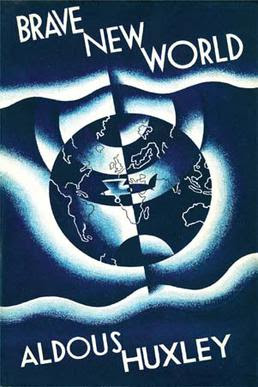Book #48
Brave New World is a dystopian novel by English author Aldous Huxley, written in 1931 and published in 1932. Largely set in a futuristic World State, inhabited by genetically modified citizens and an intelligence-based social hierarchy, the novel anticipates huge scientific advancements in reproductive technology, sleep-learning, psychological manipulation and classical conditioning that are combined to make a dystopian society which is challenged by only a single individual: the story's protagonist.
I’ve owned this novel for eleven years, and until now I’ve never opened it. I truly love dystopia, but sometimes there’s just something there which jars me, something not quite impossible, something which feels very close and moving closer. I was frightened of this with Huxley, and I had every right to be.
Brave New World focuses on technology, and how it can control the world. Huxley’s main focus is cloning and conditioning - producing humans in mass capacities, and training them to believe, desire, compute, and feel, according to the caste they’ve been assigned.
Now, this caste system is the most perverse of all of Huxley’s dystopian ideas. Each human is assigned their own social destiny from a range of different power levels, and conditioned to love the work they do, to love the caste they’ve been placed within, and to never aspire to anything higher (or indeed lower) than their own area.
Members of higher castes are produced individually, and given the privilege of being unique. Lower castes are produced by the multitude - all looking similar, with similar feelings, and similar thoughts and opinions. They think as one, they believe as one, and all together they are happy as one. Any risk of social uprising is eradicated, and every member of society is content with their lot, despite being denied individuality, aspirations, or any possibility of personal development or advancement. The oppression is absolute.
The conflict appears when John is discovered living in a ‘savage’ reservation. Having been born there after his mother went missing on a holiday to the reservation, he’s grown up away from the brave new world, and has experienced rejection due to his parentage. He feels alone and rejected, and the opportunity to live in the world described to him by his mother cannot be turned down. Soon, we see his discomfort at the accepted norms of this new world, and see him try to fathom these.
It’s all quite simply terrifying and incomprehensible; to be constantly living in a state of happiness, entirely free of sadness, with your brain conditioned to find any factor of life wonderful at best and neutral at worst. And really, if you eradicate sadness, then what is happiness? It’s just the norm, and when is the norm truly wonderful? There’s just too many things to think about here, and my brain is a cesspool of conflicting philosophies.
I’m placing myself on a dystopia ban for a while.

